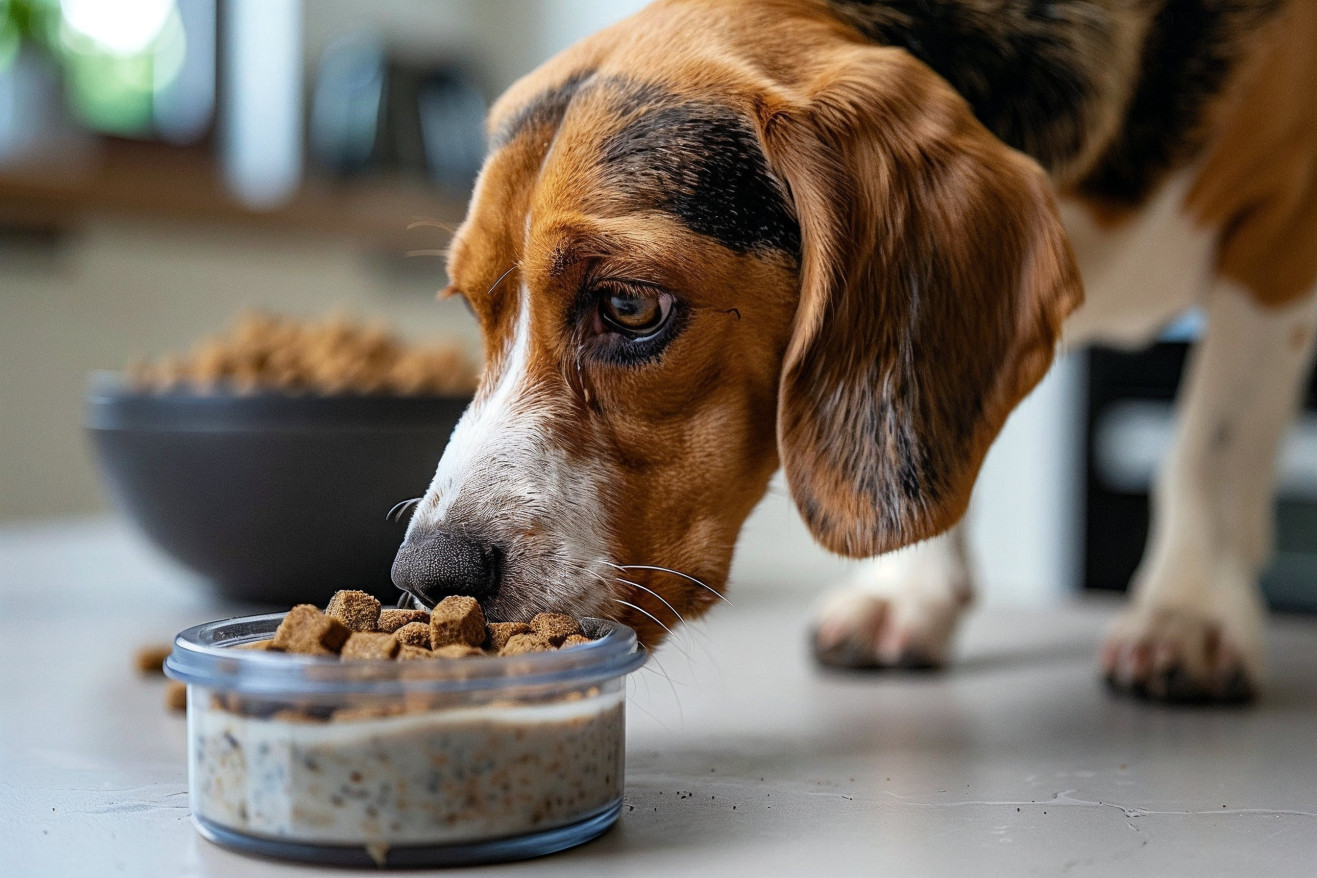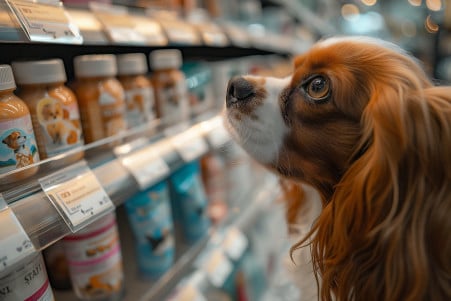Can Dogs Have Xanthan Gum? What to Know About This Food Additive
17 April 2024 • Updated 16 April 2024

If you’ve noticed your dog staring at the xanthan gum in your kitchen, you might be wondering if xanthan gum is safe for dogs. While xanthan gum is safe for dogs to eat in small amounts when it’s an incidental ingredient in other foods, eating too much of it can cause digestive problems like gas, bloating, and diarrhea.
This article takes a deep dive into the research on xanthan gum, what it is, and how it affects dogs to help you better understand whether or not it’s safe for dogs and how to use it properly. By looking at information from veterinary research, food science studies, and expert opinions, we’ll cover the many things that impact whether or not xanthan gum is safe for dogs to eat.
Is xanthan gum safe for dogs?
Xanthan Gum in Dog Food and Treats
Xanthan gum is used in many commercial dog foods, treats, and supplements. It is primarily used as a thickening, stabilizing, and emulsifying agent to help hold ingredients together and improve texture, according to Petfood Industry.
This functional carbohydrate is especially helpful in wet and canned dog foods, where it can be used to create a more uniform, thicker product that has a longer shelf life. According to the European Food Safety Authority, xanthan gum is authorized for use in feedingstuffs for all animal species with a recommended usage level of 100-10,000 mg/kg of feed.
Pet food companies are required to adhere to the maximum levels of xanthan gum that can be added to their products, and it must meet the specifications for identity and purity set by Regulation (EC) No 231/2012. According to PetMD, xanthan gum is most often used in wet dog foods, gravies, milk replacers, and liquid supplements.
Possible Risks and Digestive Problems
Although xanthan gum is considered safe for dogs in the amounts found in commercial pet food, excessive consumption can lead to digestive problems for some dogs. Ingreland lists common side effects as gas, bloating, diarrhea, and loose stools. These side effects are generally mild and short-term, but dogs with sensitive stomachs may be more susceptible.
The PMC study on xanthan gum showed that high doses in neonatal piglets caused changes in the intestines, including minimal to moderate histopathological findings in the large and small intestine. These findings were less pronounced in lower doses, but the study still suggests that pet owners should watch their dog's response to food with xanthan gum, especially if the dog has a history of digestive issues.
If a dog experiences severe or long-lasting digestive problems after eating xanthan gum, it's best to talk to a vet. Petskeeda also says that while it's uncommon, some dogs may be allergic to xanthan gum or the ingredients that it comes from, which can cause more severe symptoms.
Allergies and Sensitivities to Xanthan Gum
Although xanthan gum is safe for dogs in normal quantities, some dogs may have allergies or sensitivities to the food additive or its source ingredients, which include corn, soy, or wheat. Bone Voyage Dog Rescue notes that dogs with food allergies or intolerances are more likely to have negative reactions to xanthan gum.
Symptoms of an allergy to xanthan gum can include skin problems, itching, vomiting, and breathing issues. Brova says it's important to watch a dog closely when you first give them food that contains xanthan gum, especially if the dog has a history of allergies. If you notice any symptoms that are concerning, it's best to contact your vet.
Although it's uncommon, some dogs may have allergies to xanthan gum or its source ingredients. Pet owners should be cautious when introducing this popular ingredient in pet food, especially if their dog has sensitivities, and should seek medical advice if they notice any negative symptoms.
Safe Use and Dosing
There are no official dosing guidelines for xanthan gum in dogs, but it's always best to use any food additive in moderation. I and love and you explains that the small amounts found in commercial pet foods are safe for most dogs. However, Hepper notes that you should avoid giving dogs large amounts of xanthan gum or human foods that contain a lot of the additive, as it can cause digestive problems like diarrhea and vomiting.
To make sure that you're not giving your dog too much xanthan gum, make sure that it's a small part of their diet. Cape Crystal Brands also suggests that you talk to your vet, especially if your dog has any health issues or sensitivities, to get a better idea of how much xanthan gum is safe for your dog. By using xanthan gum in moderation and with care, you can make sure that you're not putting your dog's health at risk.
Substitutes and Natural Alternatives
For dog owners who would rather not give their dogs xanthan gum or other additives, there are a number of natural thickeners that can be used as substitutes. Healthline lists psyllium husk, chia seeds, ground flax seeds, and egg whites as some of the best alternatives.
Psyllium husk, which comes from the seeds of the Plantago ovata plant, has been shown to help reduce blood sugar and is a thickening agent like xanthan gum. Chia seeds and flax seeds both form a gel when mixed with water, which makes them good thickeners. Egg whites are both a leavening and thickening agent.
In addition to these natural substitutes, All About Dog Food lists other gelling agents and thickeners that are commonly used in dog food, including agar-agar, carrageenan, and guar gum. These substitutes may be appropriate for dogs that are allergic or sensitive to xanthan gum.
It's important to talk to your vet or a pet nutritionist before making any major changes to your dog's diet to make sure that any new ingredients are safe and suitable for your dog's specific needs.
Conclusion: Everything in Moderation and Watch for Allergies
In short, xanthan gum is safe for dogs in small amounts as part of a balanced diet. However, overconsumption of this common food additive can cause gastrointestinal issues, including gas, bloating, and diarrhea in some dogs.
Although allergic reactions to xanthan gum are uncommon, pet owners should watch their dog for any signs of an allergic reaction when they introduce foods that contain this ingredient, especially if the dog has a history of allergies. Pet owners should consult a veterinarian if their dog shows any signs of an allergic reaction after consuming xanthan gum.
While xanthan gum is regulated in commercial pet foods, some pet owners may want to avoid or limit their dog's exposure to this ingredient. This decision should be made based on the pet's individual needs and the pet owner's preferences, and pet owners should consult with their veterinarian for personalized recommendations.


